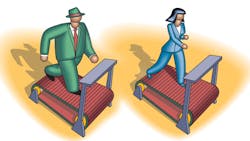Want to Bet on Your Employee's Health?
What would drive manufacturers such as Bally Technology, Huntsman, GHSP, Appleton Papers, and Intermec to place a bet that can bring a reward worth $10,000 to help employees improve their health? The lure of success would.
Studies have shown that cash incentives work as a way to encourage people to change their lifestyle, especially when it comes to weight loss.
And weight loss is now the predominant health problem within the workforce. Obese workers miss 450 million more days of work than their healthy counterparts. While the term obese might seem excessive, it's not. More than 85% of workers are obese.
What is all of this costing? In terms of lost productivity obesity is costing businesses $153 billion annually according to a Gallup pool.
Another factor that is playing into employers favor in terms of helping employees get healthy is that starting in 2014, according to the new Affordable Health Care Bill (Section 2705), employers can use measures such as BMI to adjust employee health insurance premiums based on outcome-based wellness incentives by up to 30% -- up from the current 20% level.
But charging employees more for healthcare if they don't meet BMI standards is not usually the choice of employers. Finding ways to reduce costs due to health conditions is the preferable measure.
Finding that right level of incentive isn’t easy. “The truth is that $150 or even $500 won't change behavior," explains HealthyWage CEO David Roddenberry. "It's not enough. But the chance for a team to win $10,000, now that's sufficient."
Roddenberry is referring to one of his company's more popular programs that large employers can sign up for called $10,000 Team Weight Loss Challenge. In a company vs. company division employees compete against other organizations to have their employees lose the greatest percentage weight.
HealthyWage provides the cash reward for this program as well as any marketing or tracking materials necessary.
Employees can earn money losing weight through any diet and/or fitness program they choose to follow or any other formal or informal diet/fitness regimen.
Participants in this program have had a median weight loss of 4.6% and more than 40% of participants losing over 5% of their body weight — a clinically significant amount associated with improved health and lowered health care costs.
"One of the collateral benefits of this team approach is that it builds relationships within the company," Roddenberry said. "It's a great excuse to work together."
Another program which is on an individual basis is called the BMI Challenge. For this program the employee pays the cost. The program pays $1,000 to those who invest $300 to participate and move from an obese BMI classification (greater than 30) to a normal BMI (less than 25) over a year's time. To date, approximately 25% of individuals who committed their own money have won the cash prize. In fact, HealthyWage has discoverd that participants who put their own money at risk are more than 10-times more likely to win the BMI Challenge.
At some companies employers will help subsidize rewards for employees maintaining weight loss.
The approach to a healthy lifestyle seems to be working. In 2011 HealthyWage collectively paid dieters over $450,000 cash in 2011, with 2012 forecasted to exceed this amount.
